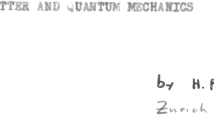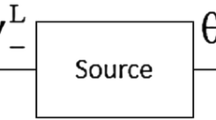Abstract
David Albert and Barry Loewer have proposed a new interpretation of quantum mechanics which they call the Many Minds interpretation, according to which there are infinitely many minds associated with a given (physical) state of a brain. This interpretation is related to the family of many worlds interpretations insofar as it assumes strictly unitary (Schrödinger) time-evolution of quantum-mechanical systems (no “reduction of the wave-packet”). The Many Minds interpretation itself is principally motivated by an argument which purports to show that the assumption of unitary evolution, along with some common sense assumptions about mental states (specifically, beliefs) leads to a certain nonphysicalism, in which there is a many-to-one correspondence between minds and brains. In this paper, I critically examine this motivating argument, and show that it depends on a mistaken assumption regarding the correspondence between projection operators and “yes/no” questions.
Similar content being viewed by others
References
Albert, D. and B. Loewer: 1988, ‘Interpreting the Many Worlds Interpretation,’ Synthese 77, 195–213.
Albert, D.: 1992, Quantum Mechanics and Experience, Harvard University Press, Cambridge.
Cushing, J.: 1994, Quantum Mechanics: Historical Contingency and the Copenhagen Hegemony, University of Chicago, Chicago.
Deutsch, D.: 1985, ‘Quantum Theory as a Universal Physical Theory,’ Int. J. Theor. Phys. 24, 1–41.
Deutsch, D.: 1986, ‘Everett's Interpretation and Experiment,’ in R. Penrose and C. J. Isham (eds.), Quantum Concepts in Space and Time, Clarendon, Oxford.
Donald, M. J.: 1990, ‘Quantum Theory and the Brain,’ Proc. R. Soc. London A 427, 43–93.
Donald, M. J.: 1992, ‘A Priori Probability and Localized Observers,’ Found. Phys. 22, 1111–72.
Donald, M. J.: 1995, ‘A Mathematical Characterization of the Physical Structure of Observers,’ Found. Phys. 25, 529–71.
Everett, H. III: 1957, ‘Relative State Formulation of Quantum Mechanics,’ Rev. Mod. Phys. 29, 454–62.
Feynman, R. P., R. B. Leighton, and M. Sands: 1965, The Feynman Lectures on Physics, Volume III, Addison-Wesley, Menlo Park.
Halliwell, J. J.: 1995, ‘A Review of the Decoherent Histories Approach to Quantum Mechanics,’ in D. Greenberger (ed.), Fundamental Problems in Quantum Theory, Annals of the New York Academy of Sciences, New York.
Lockwood, M.: 1989, Mind, Brain and the Quantum, Blackwell, Oxford.
Mackey, G. W.: 1963, Mathematical Foundations of Quantum Mechanics, Benjamin, New York.
Page, D. N.: 1995, ‘Sensible Quantum Mechanics: Are Only Perceptions Probabilistic?,’ Univ. of Alberta report Alberta-Thy-05-95, LANL preprint quant-ph/9506010.
Squires, E. J.: 1990, Conscious Mind in the Physical World, Adam Hilger, Bristol.
Tonomura, A., J. Endo, T. Matsuda, T. Kawasaki, and H. Ezawa: 1989, ‘Demonstration of Single-Electron Buildup of an Interference Pattern,’ Am. J. Phys. 57, 117–20.
Zeh, H. D.: 1970, ‘On the Interpretation of Measurement in Quantum Theory,’ Found. Phys. 1, 69–76.
Author information
Authors and Affiliations
Additional information
Thanks to David Albert, Arthur Fine, Martin Jones, and the two anonymous referees for their comments on an earlier version of this paper, and thanks to Jeremy Butterfield, Rob Clifton, Meir Hemmo and David Malament for comments on a revised version. Special thanks to Arthur for several helpful discussions.
Rights and permissions
About this article
Cite this article
Weinstein, S. Undermind. Synthese 106, 241–251 (1996). https://doi.org/10.1007/BF00413702
Issue Date:
DOI: https://doi.org/10.1007/BF00413702




